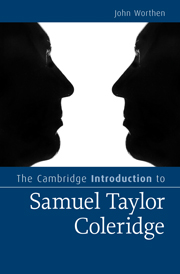Book contents
- Frontmatter
- Contents
- Illustrations
- Preface
- Acknowledgements
- Abbreviations
- Chapter 1 Early life and contexts: 1772–1802
- Chapter 2 Poetry
- Chapter 3 Notebooks
- Chapter 4 Mid-life works and contexts: 1803–1814
- Chapter 5 Language
- Chapter 6 Criticism
- Chapter 7 Later works and contexts: 1815–1834
- Afterword
- Notes
- Further reading
- Index
- Cambridge Introductions to Literature
Chapter 5 - Language
Published online by Cambridge University Press: 05 August 2012
- Frontmatter
- Contents
- Illustrations
- Preface
- Acknowledgements
- Abbreviations
- Chapter 1 Early life and contexts: 1772–1802
- Chapter 2 Poetry
- Chapter 3 Notebooks
- Chapter 4 Mid-life works and contexts: 1803–1814
- Chapter 5 Language
- Chapter 6 Criticism
- Chapter 7 Later works and contexts: 1815–1834
- Afterword
- Notes
- Further reading
- Index
- Cambridge Introductions to Literature
Summary
Working hard to choose the right word was something which Coleridge not only very much enjoyed doing, but also believed in. ‘We think in words, and reason by words’ (EHTi. 114), he had argued in 1800. When he asked himself in 1810 ‘How the human Soul is affected’, he had answered ‘by Language’ (CNiii. 3810). In 1828 he first mentioned his plan for a book ‘on the Power and Use of Words’ (‘Logic in it's living uses’) which he was still considering in 1833 (CLvi. 967) but, sadly, never wrote. Language was not simply a consequence of the human being's receptiveness to sense impressions and reflecting upon them, as had been argued by, for example, Horne Tooke, the pre-eminent English linguist of Coleridge's day. Language was, Coleridge insisted, a consequence of the mind's capacity for conscious thought. ‘Language is the medium of all Thoughts to ourselves of all Feelings to others, & partly to ourselves’ (CNiii. 4237). Accordingly, thinking played a crucial part in the human development of language. Words were not simply the ‘mere names of things’; they were things, ‘the great mighty instruments by which thoughts are excited’ (LPhili. 257). Language is a complex, historical structure which works in correspondence with ‘the operations of the mind and heart’ (TTi. 130–1).
- Type
- Chapter
- Information
- The Cambridge Introduction to Samuel Taylor Coleridge , pp. 73 - 89Publisher: Cambridge University PressPrint publication year: 2010

